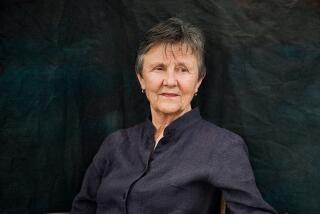Strange Love in Australia : DREAMHOUSE<i> by Kate Grenville (Viking: $14.95; 170 pp.) </i>
- Share via
“My husband was a vain man with a thick orange mustache who loved to look at his beautiful wife, slim like a model and striking on the streets. . . . As for myself, I was a woman full of greed. . . .”
These sentences are from the opening paragraph of “Dreamhouse,” a novel by Australian writer Kate Grenville, and they perfectly capture the essential qualities of Reynold (“Rennie”) and Louise, an English couple who are spending a summer in Tuscany, where Rennie plans to complete a dissertation while staying in a villa.
The villa belongs to Rennie’s London colleague, Daniel, whose grown children, Hugo and Viola, still live in Tuscany in a house adjoining the villa. “A villa,” thinks Louise, who narrates the novel. “I heard that word and became languorous, with visions of balustrades, a view of blue water, cool white wine, bare feet on marble.”
Louise is in for something of a letdown. The reality proves quite different. As Andre Maurois has pointed out, “the clash between the thrill of expectation, and the disillusioning knowledge of the truth (results) in Lost Illusion being the undisclosed title of every novel.” The villa is a wreck, infested with bird droppings, rotting timbers, and families of mice, who nest in the mattress. Some dreamhouse! Cara mia , more like nightmare shack. The villa is in the last stages of decay, and the threat of it actually collapsing forces Louise and Rennie to move next door, with Hugo and Viola. Out of the frying pan and into the fire.
There’s a sense of menace, of things going wrong, and it quickly becomes clear that what is most wrong here is the relationship between Rennie and Louise. The state of the villa can aptly be said to be a metaphor for the state of their marriage--pretty crumbly. In bed, he arches away from contact with her, and when she kisses him, rubs his lips hard “as if stung.” And yet he awakes each morning saying, “I love you, darling.” Theirs is an odd relationship, and it becomes clear why: Daniel arrives from London, and before Louise can say buon giorno, he’s making eyes at her husband, taking long walks with him in the woods, and reappearing with a smile.
Throughout this novel, there’s a feeling of ripe sexuality, and of longing that may or may not be fulfilled. All kinds of flirtations occur and prompt questions: Are Daniel and Rennie really lovers? Have Hugo and Viola, the brother and sister, really been incestuous? Are Viola and Louise playing out an attraction?
“Do not pity me,” Louise thinks when Viola’s hand drops onto her thigh during a car ride. “My husband has his dapper seducer and you have your teasing brother, who might or might not be your lover. But I will not have you pitying me for being lovely but alone.” It isn’t pity, however, that motivates any of these people who are pretty solipsistic creatures, but something much closer to decadence or boredom, as well as the greed and vanity alluded to in the first paragraph.
Grenville’s first novel, “Lilian’s Story,” was the fictionalized account of a real-life Sydney bag lady named Bea Miles, who in the ‘30s and ‘40s was a familiar sight on the city’s streets, reciting Shakespeare, stopping passers-by with her oration. “Stunning,” reviewers said of it, “strikingly original, bound for glory.” It won prizes and earned grants for the author. Obviously, she’s made a challenging step in different direction with “Dreamhouse,” which is by and large a very intriguing novel. If I had to use one word to describe this writing, it would be exotic .
Why a feeling of hollowness then? According to Robert Hughes, author of “The Fatal Shore,” an account of the convict founding of Australia, what those original settlers bequeathed to their offspring was “a kind of tough passivity, a way of seeing life without expectations.” The characters in this story are not Australian, it’s true, but the author is, and it may be just this legacy, the tough passivity inherent in the national character, that imbues this story with its disturbing, and yet moving, sense of lethargy and fatalism.
More to Read
Sign up for our Book Club newsletter
Get the latest news, events and more from the Los Angeles Times Book Club, and help us get L.A. reading and talking.
You may occasionally receive promotional content from the Los Angeles Times.








